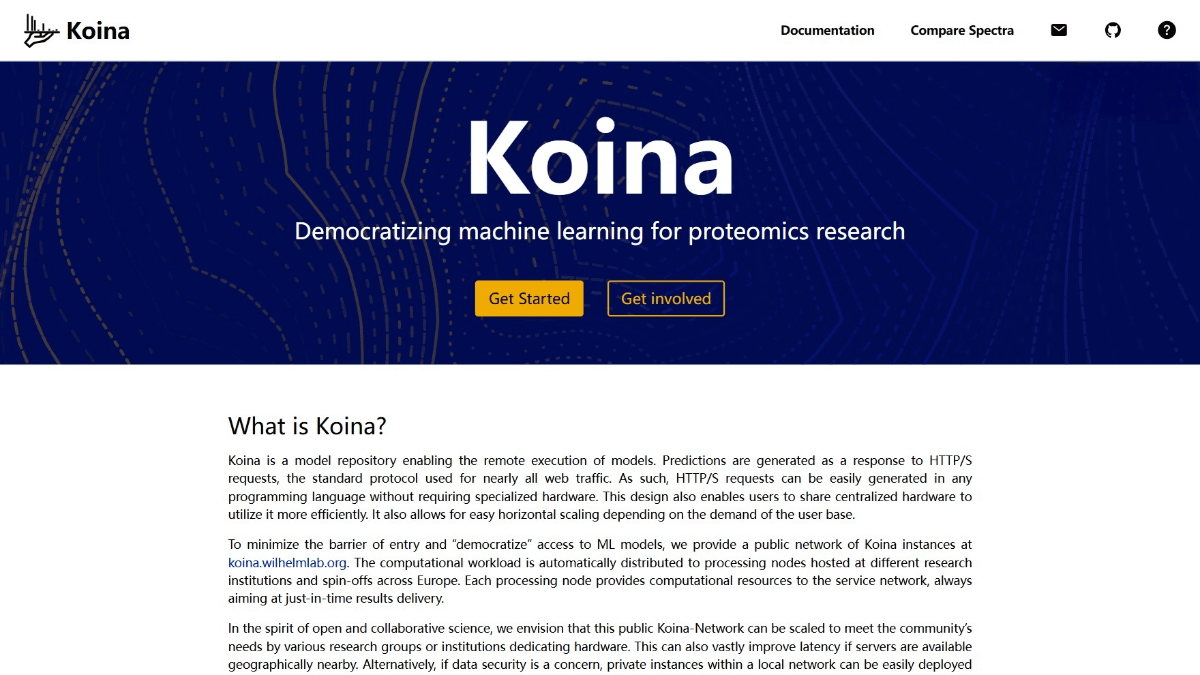What is Koina?
Koina is an open-source, decentralized machine learning platform designed for proteomics research. It provides standardized interfaces and an online model repository, enabling researchers to easily upload, share, and invoke machine learning models without local deployment. The platform automatically recommends the most suitable model, streamlining data analysis workflows and improving the efficiency of peptide identification and post-translational modification analysis. Koina supports version control and private deployment, ensuring reproducible experiments and data security. By lowering the barrier to machine learning adoption, Koina fosters innovation and broad use of ML in proteomics through community collaboration.

Key Features of Koina
Model Sharing and Management:
Researchers can upload, store, and share machine learning models that are accessible to users worldwide.
Automatic Model Recommendation:
Based on input data and task objectives, the platform automatically recommends the most suitable model, lowering the expertise required.
Remote Inference Service:
Provides remote model execution via HTTP/S APIs, allowing users to obtain prediction results without local deployment.
Standardized Interfaces:
Offers unified input–output formats and encapsulates complex preprocessing and postprocessing steps to simplify use.
Version Control & Reproducibility:
Supports model versioning to ensure experimental results can be consistently reproduced.
Private Deployment Options:
Allows deployment of private instances within local networks to meet strict data security requirements.
Technical Principles Behind Koina
Distributed Computing:
Uses Docker containers and GPU acceleration to distribute computation across multiple nodes, enabling efficient parallel processing.
Standardized Interfaces:
Provides a unified model invocation interface through RESTful APIs with support for multiple programming languages.
Heuristic Algorithms:
Automatically selects the optimal model based on the input data and the task, improving prediction accuracy and efficiency.
Continuous Integration and Updates:
Employs GitHub Actions for automated model updates and version management, ensuring continuous optimization of the platform.
Execution Graph Encapsulation:
Encapsulates models along with their preprocessing and postprocessing steps into independent computational units, visualizing analytical workflows to enhance interpretability.
Koina Project Links
Project website: https://koina.wilhelmlab.org/
GitHub repository: https://github.com/wilhelm-lab/koina
Technical paper: https://www.nature.com/articles/s41467-025-64870-5
Application Scenarios of Koina
Proteomics Data Analysis:
Improves peptide identification accuracy and enhances the efficiency of post-translational modification analysis, benefiting spectral library construction.
Biomarker Discovery:
Supports rapid screening of disease-related biomarkers and potential drug targets.
Multi-omics Data Integration:
Facilitates integrated analysis of proteomics and other omics data, enhancing biological interpretation.
Laboratory & Research Collaboration:
Enables model sharing and remote access to computational resources, promoting collaboration across labs and research institutions.
Education and Training:
Serves as a teaching tool to help students and beginners quickly learn how machine learning is applied in proteomics.




